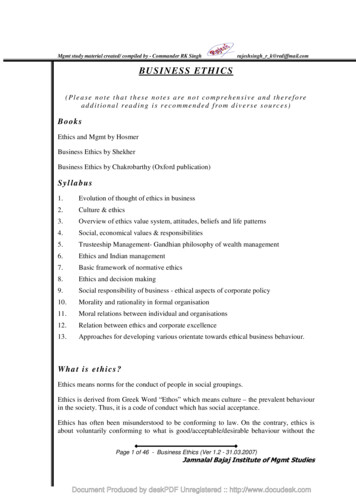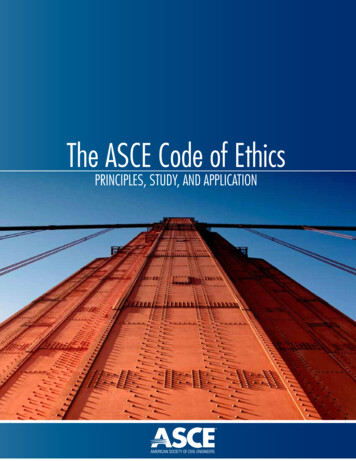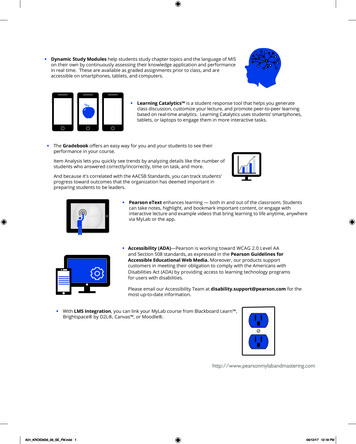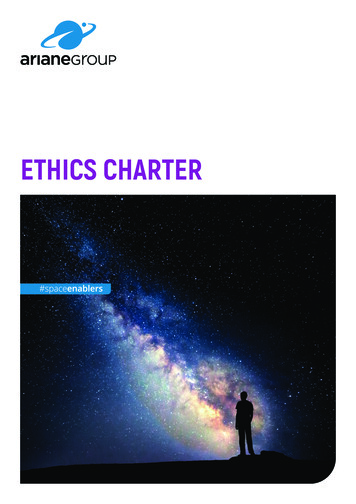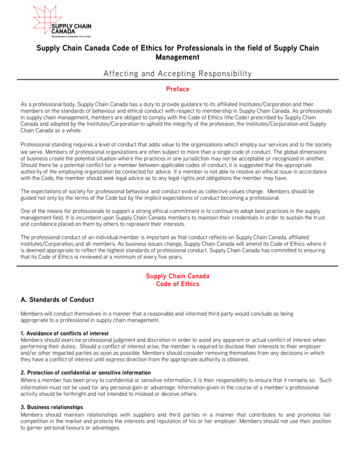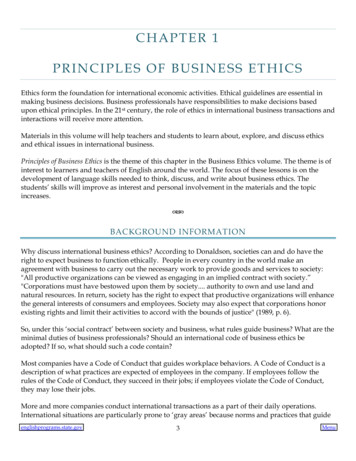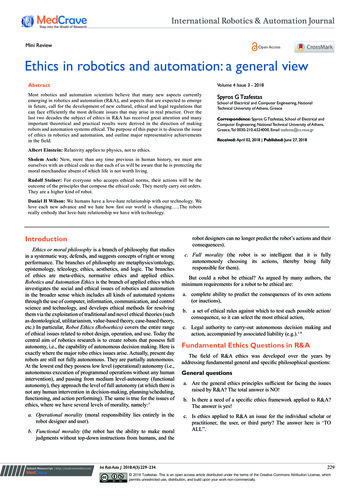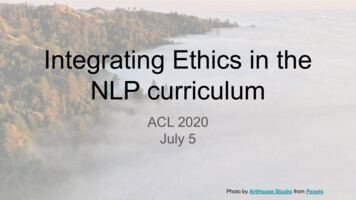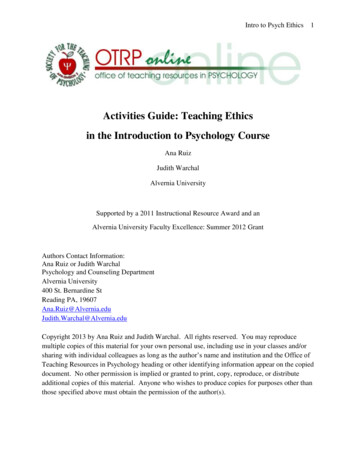
Transcription
Intro to Psych Ethics1Activities Guide: Teaching Ethicsin the Introduction to Psychology CourseAna RuizJudith WarchalAlvernia UniversitySupported by a 2011 Instructional Resource Award and anAlvernia University Faculty Excellence: Summer 2012 GrantAuthors Contact Information:Ana Ruiz or Judith WarchalPsychology and Counseling DepartmentAlvernia University400 St. Bernardine StReading PA, eduCopyright 2013 by Ana Ruiz and Judith Warchal. All rights reserved. You may reproducemultiple copies of this material for your own personal use, including use in your classes and/orsharing with individual colleagues as long as the author’s name and institution and the Office ofTeaching Resources in Psychology heading or other identifying information appear on the copieddocument. No other permission is implied or granted to print, copy, reproduce, or distributeadditional copies of this material. Anyone who wishes to produce copies for purposes other thanthose specified above must obtain the permission of the author(s).
Intro to Psych EthicsTable Of ContentsPageIntroduction3References5Activities by ntroductionResearchBiology and BehaviorSensation and PerceptionLearningMemoryConsciousnessThinking and CognitionLanguageIntelligenceHealthLifespan DevelopmentMotivation and EmotionSocial PsychologyPersonalityPsychological Disorders and TherapyGender and SexualityOther Ideas678910111213141516171819202122232
Intro to Psych Ethics3IntroductionThe field of psychology is noted for its focus on ethical practice. The integration ofethics into the undergraduate curriculum is often a subject that spawns considerable debate. ThisActivities Guide is designed to alleviate some of the apprehension about how to integrate ethicsinto the undergraduate psychology curriculum, specifically an Introduction to Psychologycourse. The activities proposed in this guide facilitate the achievement of the recent AmericanPsychological Association [APA] publication Principles for Quality Undergraduate Educationin Psychology (2011), which reinforces the importance of ethics in the undergraduatecurriculum:Principle 1 Recommendation 5. Students strive to become psychologicallyliterate citizens. Psychological literacy includes having a basic knowledge ofthe subject matter of psychology, valuing scientific thinking, acting ethically,recognizing and fostering respect for diversity, and being insightful about one’sown and others’ behavior and mental processes. (p. 3)Principle 2 Recommendation 1. Faculty provide instruction in the ethicalstandards that undergird [the discipline of psychology] and model this behavioracross professional settings. (p. 4)Principle 3 Recommendation 2. Ethics and issues related to diversity areincorporated throughout the curriculum. (p. 5)Principle 5 Recommendation 1. To affect change in the perceptions of thegeneral public and policymakers, all psychologists should develop and espousethe concept of psychologically literate citizens. They should then convey thismessage so that policymakers and the general public will understand that beingpsychologically literate is similar to being able to read or use numbers inthinking. They act ethically. (p. 7)This emphasis on ethics strengthened the APA’s commitment to ethics training in itspublished Guidelines for the Undergraduate Psychology Major (2007). The APA (2007)guidelines identify specific recommended student learning outcomes for ethics as follows:1.2.2.5.4.5.5.1.6.3.9.4.Demonstrate knowledge and understanding representing appropriatebreadth and depth in selected content areas of psychology:(e) Relevant ethical issues, including a general understanding of theAPA Ethics Code [2002]. (p. 12)Follow the APA Ethics Code in the treatment of human and nonhumanparticipants in the design, data collection, interpretation, and reportingof psychological research. (p. 14)Recognize that ethically complex situations can develop in theapplication of psychological principles. (p. 16)Recognize the necessity of ethical behavior in all aspects of the scienceand practice of psychology. (p. 17)Use information and technology ethically and responsibly. (p. 18)Display high standards of personal integrity with others. (p. 21)
Intro to Psych Ethics4Our guide presents activities related to ethics for each chapter in a typical Introduction toPsychology text as it integrates the APA Learning Goals and Outcomes for ethics into thatcourse. For each chapter, the activity lists the student learning outcome, instructions forconducting the activity, materials needed, approximate time required, and a method ofassessment.To determine the assessment method for each activity, we used the APA AssessmentCyberguide for Learning Goals and Outcomes (2009). The cyberguide rates assessmentmethods from “optimal potential” to “not recommended.” The assessment methods proposed forthe activities in this guide have optimal or strong potential for the outcomes indicated. Refer tothe cyberguide for more information or alternative assessment methods. Instructors can usemultiple assessments; the ones proposed on this guide are just suggestions.Although a few activities may require some planning, many are easily conducted withminimal preparation. Some are more appropriate in small classrooms for group discussions;however, most of the ideas may be presented in a lecture setting. Even though the activitiesfocus on an introductory psychology class, many of them can be easily adapted to otherpsychology courses.We encourage instructors of the Introduction to Psychology course to relate the ethicsactivities to current events. The examples and links provided in this guide are a sampling ofcontemporary events relevant to the time the guide was written. We suggest that instructorsincorporate news reports, music, articles of popular interest, and videos that will capture theinterest and imagination of students.We recommend that instructors be creative in the use of these activities and assessments.For example, we suggest service-learning as an activity for the Lifespan Development chapter,but it could easily be used in the Social, Research, and Learning chapters. A classroom debatewould be appropriate for any chapter provided a relevant ethical issue is being discussed.Many of the activities require students to explore the Ethical Principles of Psychologistsand Code of Conduct ([APA Ethics Code]; APA, 2002). We believe that developing meaningfulactivities that relate to the APA Ethics Code and asking students to apply the relevant sections ofthe Code to the activity will enhance students’ interest in the Code and investigation of it.Through the exploration of ethical situations, not only will students be exposed to thecomplexities of ethical decision making in the field of psychology but also they will bechallenged to think about their personal value systems. This active pedagogy allows for skilldevelopment, values clarification, and exploration of complex, realistic, and sometimescontroversial issues in psychological ethical decision making.
Intro to Psych EthicsReferencesAmerican Psychological Association. (2002). Ethical principles of psychologists and code ofconduct. American Psychologist, 57, 1060–1073. can Psychological Association. (2007). APA guidelines for the undergraduate psychologymajor. Washington, DC: Author. Retrieved r-guidelines.pdfAmerican Psychological Association, the Board of Educational Affairs (2009). Assessmentcyberguide for learning goals and outcomes. Washington, DC: Author. Retrieved guide-v2.pdfAmerican Psychological Association (2010). 2010 Amendments to the 2002 “Ethical principlesof psychologists and code of conduct.” American Psychologist, 65, 493.http://dx.doi.org/10.1037/a0020168American Psychological Association. (2011). Principles for quality undergraduate education inpsychology. Washington, DC: Author. Retrieved les.aspx5
Intro to Psych roductionJeopardy Game: APA Ethics Code1.2.e. Demonstrate knowledge and understanding representing appropriatebreadth and depth in selected content areas of psychology. . . , including ageneral understanding of the APA Ethics Code (2002).Play the Jeopardy game in class using the APA Ethics Code. Ethics may be thefocus of the whole game or presented just in one column. The game can beplayed:1. prior to the discussion of the code, which requires students preparation,2. at the end of the discussion of the code,3. at the end of the Introduction chapter, or4. at the middle or end of the semester.APA Ethics Code and for game templates seeLord, P., Martin, M. M., & Abramson, C. I. (2007). The use of PowerPointshareware for making Jeopardy!- type games in the teaching ofpsychology. Perceptual & Motor Skills, 105, 8-14.http://dx.doi.org/10.2466/PMS.105.1.8-1430 to 50 minutes, depending on difficulty level.Answers to game. Objective or essay tests (strong potential).
Intro to Psych ssion: Research ethics1.2.e. Demonstrate knowledge and understanding representing appropriate breadthand depth in selected content areas of psychology including relevant ethicalissues, including a general understanding of the APA Ethics Code (2002).2.5. Follow the APA Ethics Code in the treatment of human and nonhumanparticipants in the design, data collection, interpretation, and reporting ofpsychological research.4.5. Recognize that ethically complex situations can develop in the application ofpsychological principles.5.1. Recognize the necessity of ethical behavior in all aspects of the science andpractice of psychology.1. Provide students with published research projects or articles about research(see materials below).2. Ask students to identify proper ethical procedures as well as ethical violations.3. Ask students to identify sections of APA Ethics Code as it applies to the issuesidentified.APA Ethics CodeCarey, B. (2011, November 2). Fraud case seen as a red flag for psychologyresearch. The New York Times. Retrieved arch-fraud.htmlEnserink. M. (2012, June 25). Rotterdam marketing psychologist resigns afteruniversity investigates his data. Science. Retrieved /06/rotterdam-marketingpsychologist.htmlMilgram, S. (1963). Behavioral study of obedience. Journal of Abnormal andSocial Psychology, 67, 371-378. http://dx.doi.org/10.1037/h0040525Tuskegee Syphilis Study Legacy Committee. (1996). Bad blood: The Tuskegeesyphilis study. Retrieved fromhttp://www.hsl.virginia.edu/historical/medical history/bad blood/Zimbardo, P. G. (1999). Stanford prison experiment: A simulation study of thepsychology of imprisonment conducted at Stanford University[Presentation Slides]. Retrieved from http://prisonexp.org/15 minutes per case.Objective or essay tests (strong potential for 1.2.e),Feedback in writing at end of class (as essay question, strong potential for 4.5).Reflection paper (strong potential for 5.1).
Intro to Psych tionsMaterialsTimeRequiredAssessment8Biology and BehaviorResearch and Debate: Is it ethical to allow children to play sports like football andsoccer where concussions are prevalent?4.5. Recognize that ethically complex situations can develop in theapplication of psychological principles.5.1. Recognize the necessity of ethical behavior in all aspects of thescience and practice of psychology.1. Divide class into two groups – for and against sport participation.2. Allow students one week to research specific questions about thea) incidence of concussions in football and soccer for ages 5-7, 8-10, and 1113.b) critical areas of brain development at the ages of 5-7, 8-10, and 11-13.c) effects of concussions on the developing brain. (See Materials below.)3. Have students research the responsibilities of adults who care for children.4. Based on the research, students present oral arguments for or against havingchildren play sports where concussions are likely to occur, with an emphasison brain development and ethical responsibility.Articles related to children, sports, and concussions, such asCenter for Disease and Control Prevention. (2010, June). Heads up concussion inhigh school sports: A guide for coaches. [PDF document]. Retrieved fromhttp://www.cdc.gov/concussion/pdf/coach guide-a.pdfNational Athletic Trainers’ Association & The National Academy ofNeuropsychology. (2010). Concussion in football: Sign, symptoms, andplaying safe. [Video file]. Retrieved from http://www.nata.org/healthissues/concussionMoser, R. S., Iverson, G. L., Echemendia, R. J., Lovell, M. R., Schatz, P., Webbe,F. M., Ruff, R. M., & Barth, J. T. (2007). Neuropsychological evaluation inthe diagnosis and management of sports-related concussion. ClinicalNeuropsychology, 22, 909–916. http://dx.doi.org/10.1016/j.acn.2007.09.004One week to complete research outside class; one class period for the debate.After the debate, students will write a reflection paper on their personal reactionsto the debate and research (on content and/or process) and evaluate theirparticipation in the debate (strong potential for 4.5, strong potential for 5.1).
Intro to Psych EthicsChapterActivity NameAPA LearningOutcomeInstructionsMaterialsTime RequiredAssessment9Sensation and PerceptionVideo and Discussion: The use of psychological principles for torture2.5. Follow the APA Ethics Code in the treatment of human andnonhuman participants in the design, data collection,interpretation, and reporting of psychological research.4.5. Recognize that ethically complex situations can develop in theapplication of psychological principles.5.1. Recognize the necessity of ethical behavior in all aspects ofthe science and practice of psychology.1. Show TED talk: The Psychology of Evil (see materials below).2. Have students list all the issues related to psychology and ethics in thetalk.3. Have students list psychological issues from the talk that are related topain, perception and torture.4. Divide students into groups to discuss the pros and cons of usingpsychological principles for torture.APA Ethics CodeZimbardo, P. G. (2008). The psychology of evil [Video File]. Retrieved fromhttp://www.ted.com/talks/lang/en/philip zimbardo on the psychologyof evil.html2 hoursEssay questions related to the ethical issues in the TED talk (strong potentialfor 4.5).
Intro to Psych EthicsChapterActivity NameAPA LearningOutcomeInstructionsMaterialsTime RequiredAssessment10LearningDiscussion: Little Albert1.2.e. Demonstrate knowledge and understanding representing appropriatebreadth and depth in selected content areas of psychology includingrelevant ethical issues, including a general understanding of the APAEthics Code (2002).2.5. Follow the APA Ethics Code in the treatment of human and nonhumanparticipants in the design, data collection, interpretation, and reporting ofpsychological research.4.5. Recognize that ethically complex situations can develop in theapplication of psychological principles.5.1. Recognize the necessity of ethical behavior in all aspects of the scienceand practice of psychology.9.4. Display high standards of personal integrity with others.1. Present information about the Little Albert experiment (Watson & Rayner,1920/2000), and the articles by Beck, Levinson and Irons (2009) andFridlund, Beck, Goldie, and Irons (2012). See Materials below.2. Ask students to identify the ethical problems by using the APA EthicsCode.3. Ask students to propose ways in which the information could be gatheredin an ethical way.APA Ethics Code;Description of Little Albert experiments (available in most textbooks), alsoavailable in video clips:Beck, H. P., Levinson, S., & Irons, G. (2009). Finding little Albert: Ajourney to John B. Watson’s infant laboratory. American Psychologist,64, 605-614. http://dx.doi.org/10.1037/a0017234Fridlund, A. J., Beck, H. P., Goldie, W. D., & Irons, G. (2012, Jan. 23).Little Albert: A neurologically impaired child. History of n, J. B., & Rayner, R. (1920). Conditioned emotional reactions.American Psychologist, 55, 313-317. http://dx.doi.org/10.1037/0003066X.55.3.313. Reprinted from Journal of Experimental Psychology,1920, 3, 1-14.20 minutesQuestions on quiz/exam (strong potential for 1.2.e). Written report (strongpotential for all outcomes).
Intro to Psych EthicsChapterActivity NameAPA LearningOutcomeInstructionsMaterialsTime RequiredAssessment11MemoryDiscussion: Drugs and memory1.2.e. Demonstrate knowledge and understanding representing appropriatebreadth and depth in selected content areas of psychology includingrelevant ethical issues, including a general understanding of the APAEthics Code (2003).2.5. Follow the APA Ethics Code in the treatment of human and nonhumanparticipants in the design, data collection, interpretation, and reporting ofpsychological research.4.5. Recognize that ethically complex situations can develop in theapplication of psychological principles.5.1. Recognize the necessity of ethical behavior in all aspects of the scienceand practice of psychology.9.4. Display high standards of personal integrity with others.1. Provide scenarios for students to discuss the potential use of memoryerasing drugs:a. Soldiers returning from combat with memories of traumaticexperiences.b. Young victims of rape or other sexual assault.c. Someone involved in a serious car accident.d. A parent who lost a young child.e. Someone who broke up a serious long term relationship.f. Someone in college who got a first failing grade ever.2. Ask students to discuss:a. What would be the consequences of erasing all those memories?b. Who should make those decisions?c. Where to draw the line?d. What/who could help answer these and other questions?No materials necessary.There are video clips available for instructors’ preparation and/or for studentsto watch. Videos on erasing bad memories:Haig, S. (2007, October 15). The ethics of erasing a bad memory. Time.Retrieved ,1671492,00.htmlLevin, D. (Interviewer) & Caplan, A. (Interviewee). (2011). Ethics of erasingmemory [Interview audio file]. Retrieved from NOVA scienceNOWwebsite: .html40 minutesQuestions on quiz/test (strong potential for 1.2.e). Reflection as written report(strong potential for all outcomes).
Intro to Psych iousnessArticle Discussion: Hypnotism1.2.e. Demonstrate knowledge and understanding representingappropriate breadth and depth in selected content areas ofpsychology including relevant ethical issues, including a generalunderstanding of the APA Ethics Code (2003).4.5. Recognize that ethically complex situations can develop in theapplication of psychological principles.5.1. Recognize the necessity of ethical behavior in all aspects of thescience and practice of psychology.6.3. Use information and technology ethically and responsibly.Instructions 1. Provide the class with access to the New York Daily News article (Murray,2012) or other relevant news reports. See Materials below.2. After students read the article (or watch the video), hold a class discussion onthe ethical issues relevant to this case (such as: Informed Consent, AvoidingHarm, Boundaries of Competence).APA Ethics CodeMaterialsHaig, S. (2007, October 15). The Ethics of Erasing a Bad Memory. Time.Retrieved ,1671492,00.htmlLevin, D. (2011, January 13). Ethics of Erasing Memory [Video File]. Retrievedfrom .htmlMurray, R. (2012, June 19). Panic as students get stuck in hypnosis. New YorkDaily News. Retrieved from 21359 1 trance-hypnosis-hypnotistMore items available athttp://search.aol.com/aol/search?enabled terms &s it comsearch51&q students hypnotizedTimeRequiredAssessment60 minutes.Test questions related to hypnosis, consciousness, and ethics (strong potential for1.2).
Intro to Psych EthicsChapterActivity NameAPA sessment13Thinking and CognitionMovie Review and Discussion: I, Robot1.2.e. Demonstrate knowledge and understanding representing appropriatebreadth and depth in selected content areas of psychology includingrelevant ethical issues, including a general understanding of the APAEthics Code (2002).6.3. Use information and technology ethically and responsibly.9.4. Display high standards of personal integrity with others.1. Assign the movie I, Robot (2004). See Materials below.2. Ask students to discuss the Three Laws of Robotics in comparison withhuman laws or rules (Ten Commandments or Golden Rule).3. Ask students to discuss the Three Laws of Robotics in comparison withAPA Ethics Code (2002). Consider items such as: Beneficence andNonmaleficence, Fidelity and Responsibility, and Integrity.Further discussion could include a request for students to list behaviors orattitudes that circumvent both robotic and human laws?Option: Discussion could be assigned as work outside class and answers toquestions could be brought in prepared for class discussion.APA Ethics CodeDavis, J., Dow, T., & Godfrey, W. (Producers), & Proyas, A. (Director).(2004). I, Robot [motion picture]. USA: 20th Century Fox.Three Laws of Robotics (created by Isaac Asimov, common in sciencefiction):1. A robot may not injure a human being or, through inaction, allow a humanbeing to come to harm.2. A robot must obey orders given it by human beings except where suchorders would conflict with the First Law.3. A robot must protect its own existence as long as such protection does notconflict with the First or Second Law.Movie 115 minutes, discussion 20 minutes.Group project (strong potential for 1.2). Questions on quiz/test (strongpotential for 1.2).
Intro to Psych Ethics14LanguageChapterActivity Name Discussion: DoublespeakAPA Learning 1.2.e. Demonstrate knowledge and understanding representing appropriatebreadth and depth in selected content areas of psychology includingOutcomerelevant ethical issues, including a general understanding of the APAEthics Code (2002).4.5. Recognize that ethically complex situations can develop in the applicationof psychological principles.5.1. Recognize the necessity of ethical behavior in all aspects of the scienceand practice of psychology.9.4. Display high standards of personal integrity with others.Orwell (1946) proposed the use of language as “an instrument for expressingInstructionsand not for concealing or preventing thought.” We still have many examples incontemporary English of expressions that alter one’s perception.1. Ask students to list expressions that have been used or created to changemeaning. For instance, passed away instead of dead, for or againstabortion replaced with pro-choice and pro-life, respectively. See Materialsbelow.2. After the students create a list, ask: What are the ethical consequences ofsuch distortions? For instance, how does the audience react to the contentof a text when the information is about collateral damage versus when it isabout killing civilians during war?3. Ask students to reflect on the activity and how it relates to the APA EthicsCode. Consider items such as Beneficence and Nonmaleficence, andIntegrity.APA Ethics CodeMaterialsOrwell, G. (1946). Politics and the English language. Horizon, 13, 252-265.Available glish/e polit/For current example see:Blumner, R. E. (2011, June 5). Words used to distort, not enlighten, TampaBay Times. Retrieved used-to-distort-notenlighten/1173221Some pairings of doublespeak: capital punishment - death penalty, ethniccleansing - genocide, collateral damage - killing of civilians during war,downsize - fire employees, enhanced interrogation - torture, international foreign, person of interest - suspect in a crime.15 – 20 minutesTimeRequiredReflection (strong potential for 1.2, 4.5, 5.1, 9.4).Assessment
Intro to Psych Ethics15IntelligenceChapterActivity Name Discussion of scenario: Ethics related to intelligence testingAPA Learning 1.2.e. Demonstrate knowledge and understanding representingappropriate breadth and depth in selected content areas ofOutcomepsychology including relevant ethical issues, including ageneral understanding of the APA Ethics Code (2002).4.5. Recognize that ethically complex situations can develop in theapplication of psychological principles.5.1. Recognize the necessity of ethical behavior in all aspects of thescience and practice of psychology.6.3. Use information and technology ethically and responsibly.1. Provide the class with the following scenario:InstructionsA school psychologist administers a group IQ test to a very diverse class of300 ninth graders for the purpose of “planning their high school curriculum.”The school psychologist enters the IQ scores into the school’s computerizeddata base. Due to a glitch in the system, all of the scores are available toanyone who logs onto the school’s website. Are there ethical issues in thisscenario?2. Have students, in small groups, list the relevant ethics issues in thescenario. Some possible issues are individual versus group testing andconfidentiality, among others.3. Have students identify the relevant section from the APA Ethics Code,such as: Use of Assessments, Obsolete Tests and Outdated Tests,Maintaining Test Security.4. Ask students to comment specifically on the cultural issues andtechnological concerns.APA Ethics CodeMaterials60 to 90 minutesTimeRequiredStudents will write an analysis of the ethical issues presented in this scenario,Assessmentincorporating the APA Ethics Code and relevant excerpts from the text(optimal potential for 6.3, strong potential for 1.2, 4.5, 5.1).
Intro to Psych Ethics16HealthPoster: The ethics of eating: Can you control yourself or should thegovernment do it for you?APA Learning 4.5. Recognize that ethically complex situations can develop in theapplication of psychological principles.Outcome5.1. Recognize the necessity of ethical behavior in all aspects ofthe science and practice of psychology.1. Assign students a current article related to banning food items (seeInstructionsMaterials below).2. Have students list all the issues related to obesity in the article.3. Have students list psychological issues (such as internal vs externalmotivation) from the textbook that are related to obesity.4. Have students list the relevant ethical issues (such as Beneficence andNonmaleficence, Respect for People’s Rights and Dignity) related to thetopics listed in instructions 2 and 3.5. Divide students into groups and ask them to create a poster reflecting waysto combat obesity.APA Ethics CodeMaterialsHu, W. (2012, June 11). Obesity ills that won’t budge fuel soda battle byBloomberg. The New York Times. Retrieved sistent-obesity-fuelssoda-ban-by-bloomberg.html? r 2&pagewanted all&Other newspaper articles, newsprint, magazines.60 to 90 minutesTimeRequiredStudents will grade posters based on a rubric tailored to the activity (strongAssessmentpotential for 4.5). Rubric templates are available at www.rubrician.comChapterActivity Name
Intro to Psych Ethics17Lifespan DevelopmentChapterActivity Name Service LearningAPA Learning 1.2.e. Demonstrate knowledge and understanding representing appropriatebreadth and depth in selected content areas of psychology includingOutcomerelevant ethical issues, including a general understanding of the APAEthics Code (2002).4.5. Recognize that ethically complex situations can develop in the applicationof psychological principles.5.1. Recognize the necessity of ethical behavior in all aspects of the scienceand practice of psychology.9.4. Display high standards of personal integrity with others.1. Set up service learning activities in settings that will provide students withInstructionsopportunities to serve individuals in different stages of the lifespan. Somesuggestions of placements are the maternity ward at a hospital, a day carecenter, a school, a senior center, a nursing home. See Materials below.2. Prepare the students for the service activities. For instance, the activityshould be determined prior to the students attending the placement. Theagency representative and the students should know what is expected aswell as deadlines to be followed. The students should know who to contactin case of questions or problems.3. Have students write a reflection paper on (a) the service activity, and (b)proper ethical procedures followed, as well as potential violations of ethicalguidelines. Some items to consider: do not harm, confidentiality, privacy,anonymity.APA Ethics CodeMaterialsMany colleges and universities have a center or an officer who should be ableto help with suggestions or setting up the activity.For information on ethics and service-learning seeChapdelaine, A., Ruiz, A., Warchal, J., & Wells, C. (2005). Service-learningcode of ethics. Boston, MA: Anker.National Service-Learning Clearinghouse. (2012). America's mostcomprehensive service-learning resource. Retrieved fromhttp://www.servicelearning.org/10 -20 hours for the service.TimeRequiredReflection (strong potential for 1.2, 2.5, 4.5, 5.1, 9.4).AssessmentExternal review feedback (strong potential for 5.1, 9.4).
Intro to Ps
focus on an introductory psychology class, many of them can be easily adapted to other psychology courses. We encourage instructors of the Introduction to Psychology course to relate the ethics activities to current events. The examples and links provided in this guide are a sampling of c

